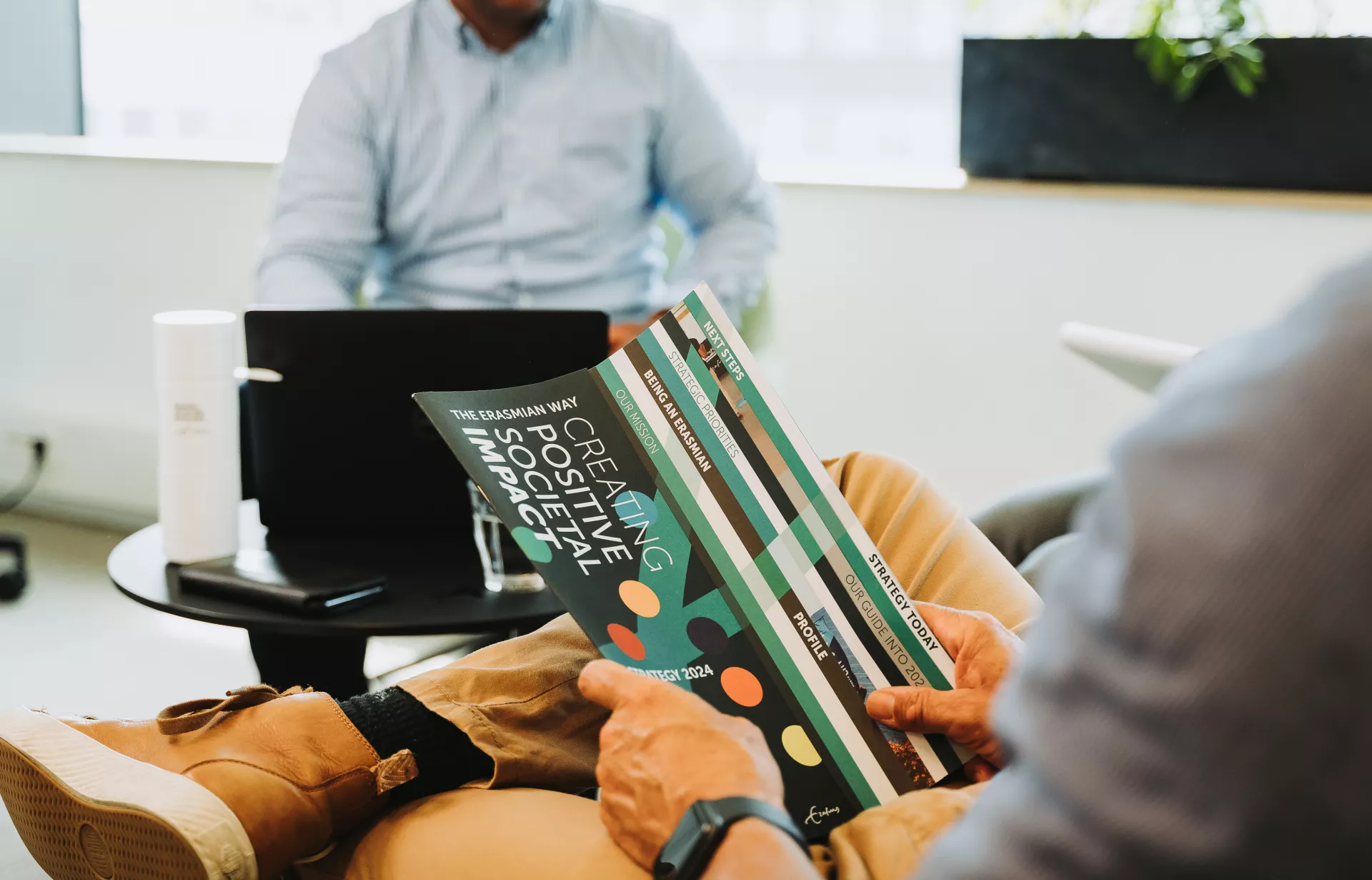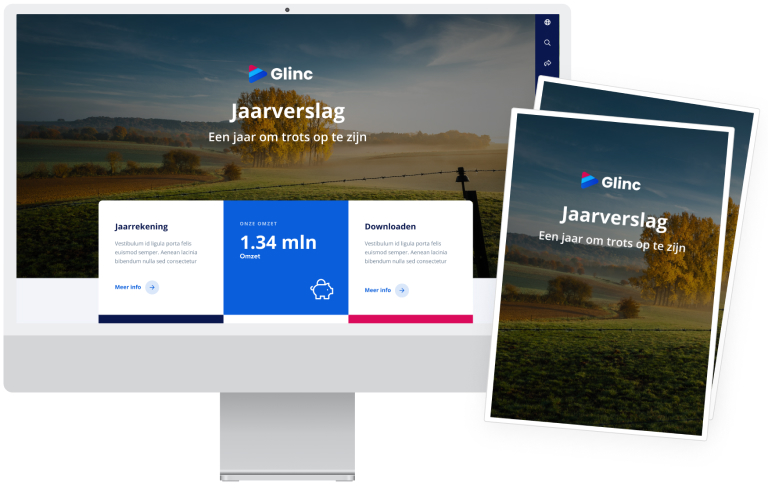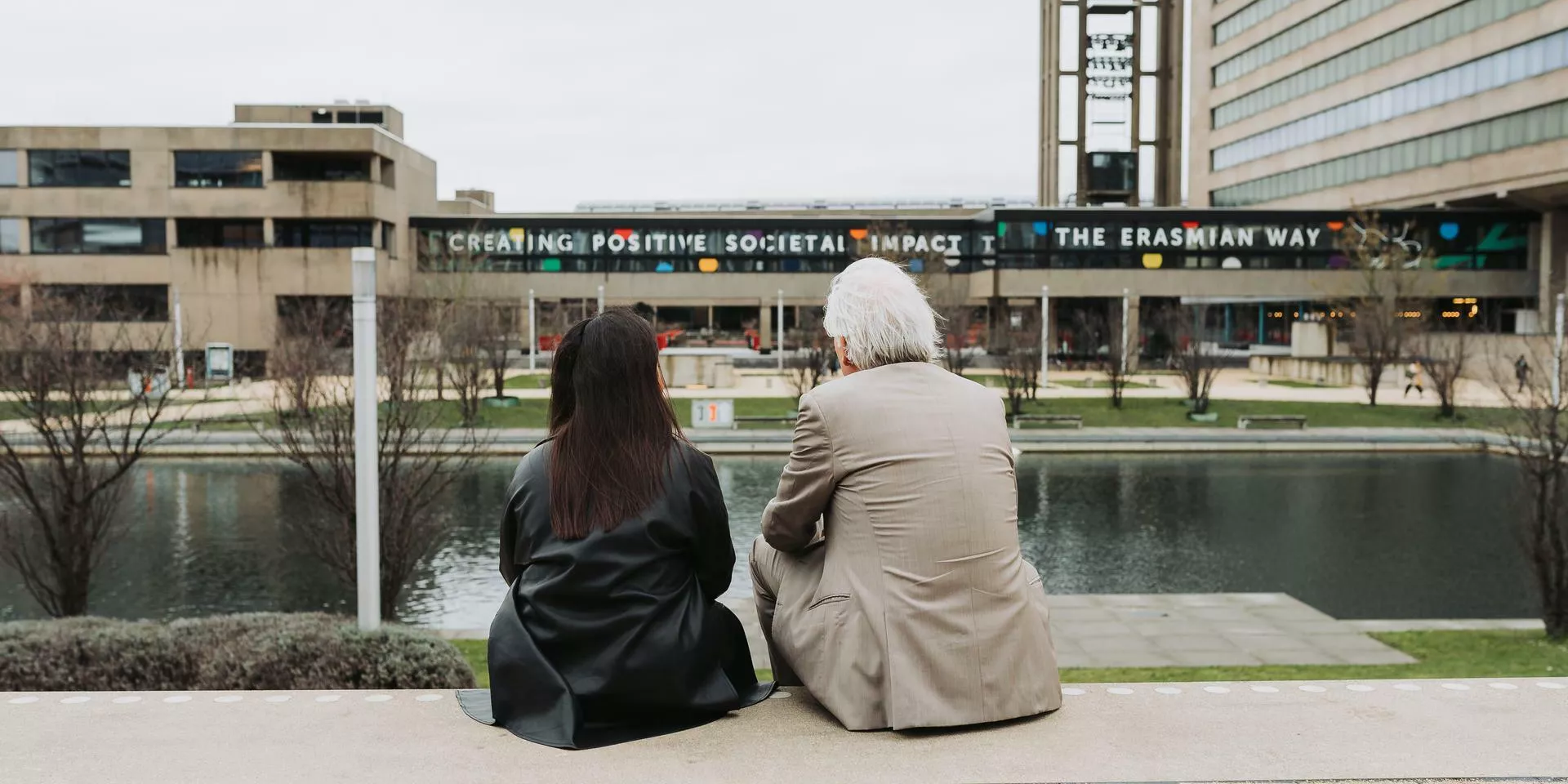
2024 Strategy
Introduction
The strategic initiatives within the EUR Strategy 2024 also showed very positive developments in 2023. It is becoming increasingly visible how the strategic projects and the entire EUR community are working to implement the mission to create positive societal impact. Because of the desired focus on impact, the Executive Board decided at the end of 2023 to appoint a Strategic Dean of Impact & Engagement at central level to connect and further drive EUR's impact and engagement ambitions. This position will be filled in 2024, for a period of four years for the time being. The position is linked to EUR's current and, to some extent, new strategic period.
In the past year, steps have also been taken to implement the recommendations of the 2022 midterm evaluation of the EUR Strategy, which included the focus areas of culture & leadership and sustainability in addition to a focus on impact.
The action plan for the development of Strategy 2025-2030 was approved at the end of 2023. Implementation of the plan will officially start in January 2024.
EUR's definition of impact
In early 2023, the document Defining social impact at EUR. A common framework for our impact strategy was formalised. The document outlines a framework for the EUR definition of impact, including an explicit reference to the organisation's three core tasks: education, research and community engagement. Through these three core tasks, we as EUR create impact together. The definition document provides guidance and serves as a starting point for the further conversation on impact at different levels in the organisation. The document also includes a number of follow-up steps, such as defining impact ambitions and strategies at faculty level and organising the portfolio around community engagement.
Several faculties have now started to develop their impact ambition and strategy.
Impact and community engagement
Considerable progress has been made in the area of community engagement. For example, several faculties have appointed a portfolio holder for impact and/or engagement and developments are underway to further analyse EUR's impact portfolio. A green paper on community engagement is also being prepared and discussions are taking place on how to create an enabling environment for community engagement. One way this is being done is by forming an engagement strategy and organising support for engagement activities. For EUR, entrepreneurialism is an important principle that is motivated and encouraged both within the primary process and by the EUR Holding, the KTO Office within ERS and our affiliated enterprises: Erasmus BV (including subsidiaries ECE and ERBS) and RSM BV.
Recognising and rewarding impact
A key condition for making the transition to an impact-driven university and fostering entrepreneurialism is recognising, valuing and rewarding impact activities and the subsequent developments and results. In addition, the transition to an impact-driven university requires new skills and competencies within the domains of education, research and engagement. It is more necessary than ever to assess and value all employees' activities and talents in a proper, less quantitative way. The Recognition & Rewards programme actively pursues this goal within the target group of academic staff, helping to strengthen the basis for the transition to an impact-driven university.
The culture change related to Recognition & Rewards continued in 2023. Both EUR-wide and within the faculties, Recognition & Rewards is being discussed more and more actively, a structural partnership has been formed with the Young Erasmus Academy and various tools have been developed and implemented. Staff are also noticing that there is scope for all the activities and talents of academics, for example through the availability of differentiated career paths, the use of narratives in appraisals and promotions and the alignment of promotion criteria.
The starting point is and remains to integrate the ideas behind Recognition & Reward into existing and new policies to be developed. For example, the programme actively contributed to the formation of the new leadership strategy, the revised PhD policy and the revised P&D policy. Both systemic and cultural change have been initiated and will continue in the coming years, leading to structural, sustainable and effective change. This change is indispensable for the transition to an impact-driven university and is essential for the current and future strategy.
Sustainability at EUR
Sustainability at EUR
Due to current social developments, EUR's sustainability programme has undergone a reformulation. The content and details of the programme will be further refined in co-creation with key EUR stakeholders in 2024.
Recognition of the climate and ecological emergency
The Executive Board released a statement in February 2023 recognising the climate and ecological emergency. The statement highlights the urgent need to broaden and accelerate the sustainability transition in research, education and operational management and the importance of further expanding the sustainability programme.
One of the initiatives for this was the development of the Industry Engagement Monitor. The first version of this monitor is available and launched in September. The monitor identifies EUR’s relationships that have an impact, positive or negative, on climate and ecosystems. Efforts will continue in 2024 to make the monitor more robust and complete and include it in regular reporting. The monitor provides the university with an annual update on its relationship with the business community.
Dialogue with the EUR community
In the second half of the year, dialogues were organised for each faculty and for Professional Services to obtain input from students and staff on sustainability at EUR. The outcome of the dialogues will be presented to the Executive Board and deans in 2024.
Excellent sustainability initiatives
Two excellent examples of high-impact sustainability initiatives within education are the launch of the new Master in Sustainability Transitions and the organisation of the Climate and Ecological Literacy Workshop on how teams and individuals can contribute to climate change challenges.
There were also positive developments resulting in a more sustainable campus. From July, all catering became vegetarian and campaigns were organised in collaboration with the catering partner to introduce staff and students to sustainable food.
Finally, several incentives were introduced to make sustainable transport more attractive for EUR employees.
You can read more about the sustainability initiatives in our education, research and operational management in the sustainability report at eur.nl/en[1]
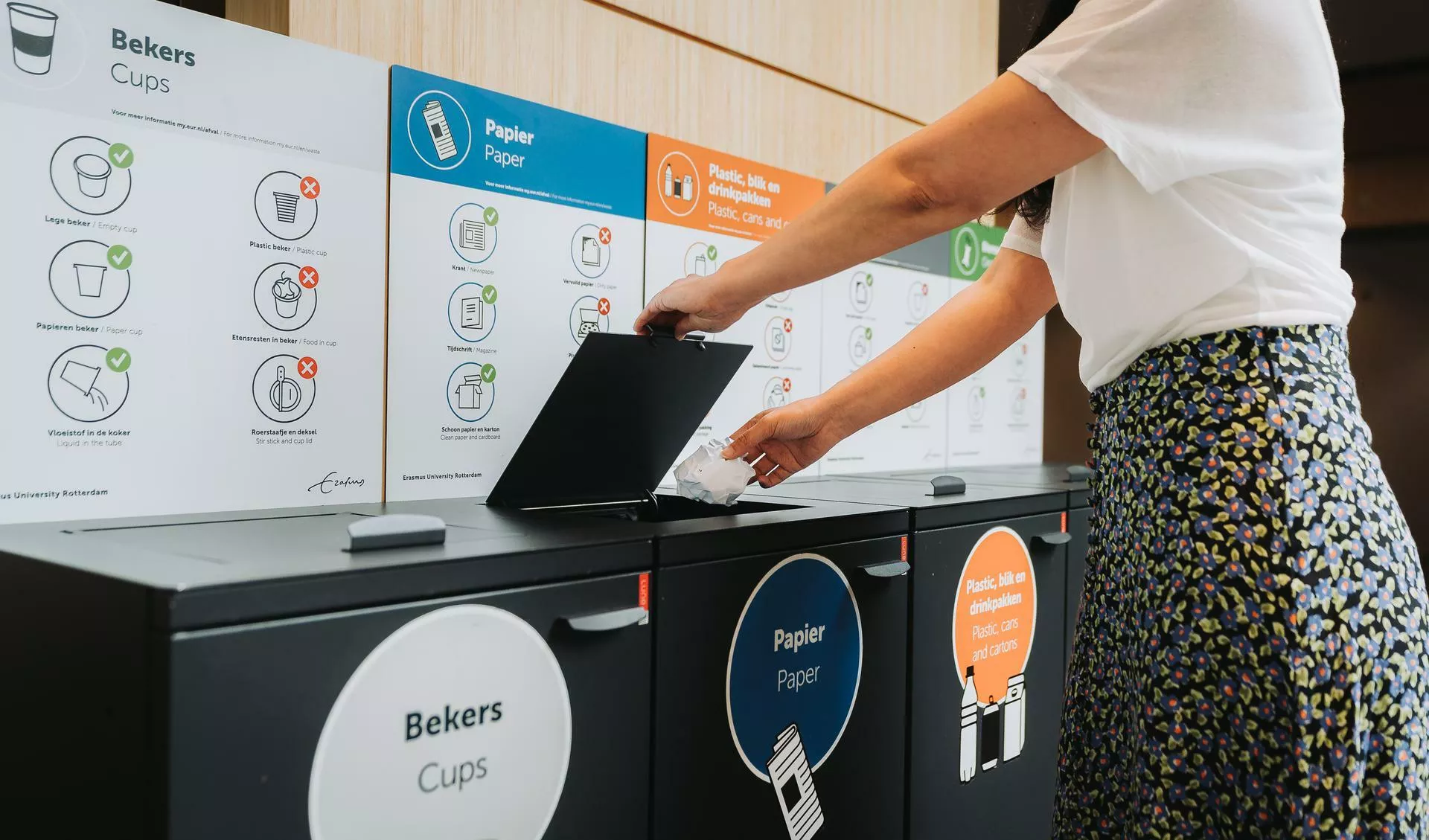
Culture and leadership
Engaged employees are the foundation for social impact. This requires a supportive culture and leadership. EUR has developed the Erasmian Leadership Profile with the aim of inspiring and guiding leaders in this development. This profile was formally launched at the first EUR Leadership Day on 23 November 2023.
The core principles of the Erasmian leadership profile
This EUR-wide leadership profile has four core principles and corresponding competencies at three levels of leadership: personal leadership, leading others and leading an organisation. The profile was developed in collaboration with representatives from faculties and departments and tested with scholars with expertise in leadership.
All faculties and departments use the profile. It provides a common frame of reference that can be applied in various processes at EUR, from recruitment and selection to evaluation and development.
A safe working environment
It is very important to EUR that its employees develop to their full potential and experience sufficient autonomy in a healthy and safe environment. Two key initiatives have been developed for this purpose. One saw the launch of a central hotline for undesirable and concerning behaviour in 2023: Safe@EUR. Another saw 14 shows of the Mindlab theatre performance. Mindlab is a theatre performance that focuses on a pleasant and safe working environment and everyone's responsibility within this environment.
Around 1,200 employees from almost all EUR faculties and departments attended the performance. Many people reported that it led to great insight and better mutual understanding. It also appears that there is a strong need to maintain a focus on social safety and a high demand for training and workshops on this topic.
The importance of strategic collaborations
At a time of increasingly complex societal challenges at national and regional levels, strategic collaborations are extremely important for universities to achieve a better understanding of and approach to these issues. Strategic alliances are a key focus within the EUR strategy. International collaboration of universities within UNIC, a cooperative arrangement of ten universities in post-industrial cities, and regional collaboration within the Leiden-Delft-Erasmus Universities (LDE) and Convergence made good progress that supports EUR's strategic ambitions.
UNIC secures continued funding
Within UNIC, a cooperative arrangement between 10 universities in post-industrial European cities, of which EUR is the coordinating institution, a number steps were once again taken in 2023 to set out common goals in more concrete terms. One such step was UNIC’s launch of a joint Redesigning the Post-Industrial City MSc programme. EUR runs this two-year European master programme with its partners in Cork, Bochum, Oulu, Koc, Deusto, Liège and Zagreb. UNIC also secured continued funding under the Erasmus+ Call for European Universities. This funding will enable the implementation of UNIC's comprehensive and ambitious mission.
EUR-TU Delft-Erasmus MC Convergence moves to the next stage
The Convergence initiative, in which EUR has partnered with Erasmus MC and Delft University of Technology to develop a more coherent approach to a number of pressing social issues, organised many activities again in 2023 on the themes of Health & Technology, Healthy Start, Pandemic Preparedness Centre (PDPC) and AI Data & Digitalisation.
EUR, Delft University of Technology and Erasmus MC also launched new research projects through the Convergence. Examples include reducing CO2 emissions in the port of Rotterdam, making health care more sustainable, making the city and society more resilient to pandemics and creating equal opportunities for children and young people. The large number of initiatives has translated into a growing Convergence community seeking to connect with stakeholders from health care, government, business and society. From this, several partnerships emerged to address issues such as health and well-being disparities in Rotterdam. Events and educational initiatives have also been organised to engage nurses, students and young researchers in the EUR-TU Delft-Erasmus MC Convergence.
After a successful exploratory phase that proved the power and importance of transdisciplinary cooperation, last year it was time for the next phase of the EUR-TU Delft-Erasmus MC Convergence. Important steps were taken in 2023 towards deeper collaboration and fusion. It has been explored in dialogue with the five programmes and representatives from different layers of the institutions how this cooperation should be given further shape and content. This process identified challenges and opportunities. Factors considered included the strategy for transformational research and education, data sharing, public affairs and funding, and operational conditions.
LDE: fostering interdisciplinary education
The LDE (Leiden, Delft, EUR) is the collaboration with Leiden University and Delft University of Technology and invests mainly in a range of joint electives and final projects. In 2023, the offerings included the minor (a 30-credit elective) Authenticity and Art Crime. At the LDE Centre for Sustainability, interdisciplinary student teams worked to address a sustainability challenge.
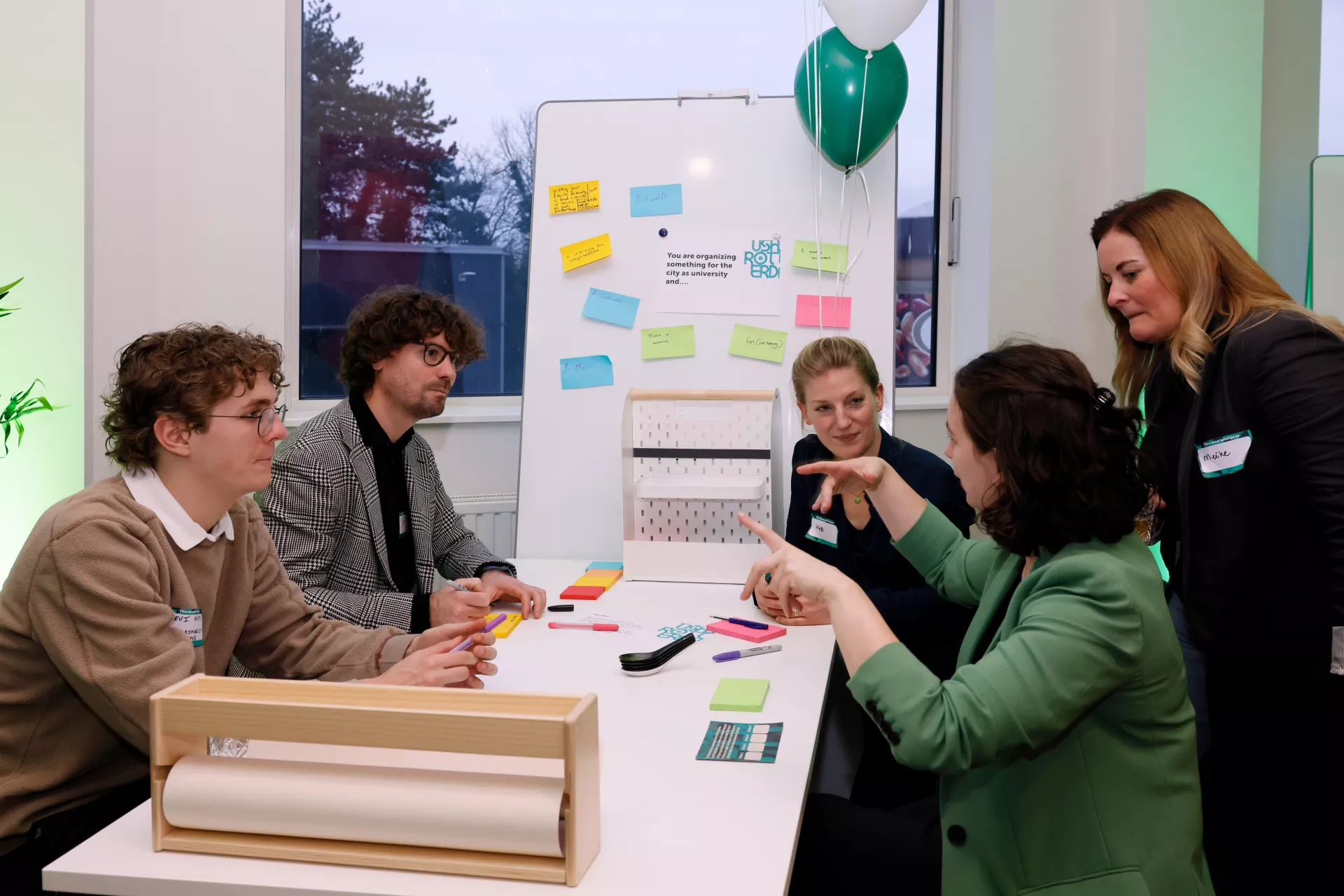
SPOTLIGHT
Erasmus Hub!
Erasmus Hub! Rotterdam opened its doors in September 2023. The Hub! is a place for creative and active learning where students develop their capacity to have societal impact. The creatively designed pop-up can be flexibly adapted and is the perfect environment for impact-driven education and engagement.
